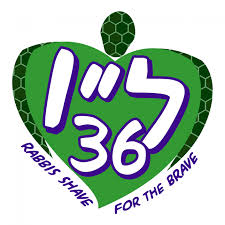While most of us are appropriately immersed in issues relating to Covid-19 or racial justice, let me bring your attention to a different matter of life and death. Recently I experienced a series of very personal “aha” moments, but with professional ramifications as well.
In January 1986, our son Joshua Daniel died after only living for six months. The cause of death was recorded as an “unknown degenerative neurological disorder.” Our Israeli geneticist hypothesized that it was likely genetic, but beyond the scope of the pre-natal testing for Tay- Sachs and other diseases that my wife, Lynn, and I had taken.

We nonetheless risked having more children and were blessed with two healthy daughters, Sara and Mica. Sara recently married and Mica is engaged. Prior to their weddings, I stressed the importance of being fully tested for so-called “Jewish Genetic Diseases.” Sara went to her doctor in Houston, explained the family history, and asked for a full Jewish genetic screening. She was pleased when the results came back completely negative.
A few months, later Mica utilized the JScreen program, based in Atlanta at Emory University, also available to anyone in the United States. Her results revealed a positive indication for a disorder, the symptoms of which sounded eerily similar to what ended her brother’s life. This was the first potential “aha” moment, a clue to solving a 34-year mystery.
However, our focus is on the present. With almost all disorders on Jewish genetic screening panels, your partner must also be a carrier—and even if both are carriers there is only a 1 in 4 chance that a baby will be afflicted. Her fiancé, a Jew by Choice, will now be tested, but it is unlikely, with his Sikh Indian biological heritage, that he is a carrier, THOUGH NOT IMPOSSIBLE.
The next “aha” moment came when Sara discovered that her testing at the doctor’s office in Houston did not include the disorder that Mica’s revealed. She then utilized the JScreen protocol, which showed she was not a carrier of that particular disorder, though she was positive for another less serious disorder. Subsequently, her husband also used JScreen for testing, revealing no problems.
My second “aha” is the new knowledge that not all Jewish genetic screenings are created equal:
- Simply suggesting to couples we counsel to seek Jewish genetic screening is not enough.
- Simply asking a doctor, even a Jewish doctor, for Jewish genetic screening is not enough.
I have subsequently been looking at programs for Jewish genetic disease screening throughout the country. Though I am by no means an expert, I have gained a better understanding of what is available and how we can best serve young couples with whom we engage.
First there is a misconception about the number of Jewish genetic diseases for which we should be concerned. We all know about Tay-Sachs. However, there seem to be others that receive prominent attention and are typically screened: cystic fibrosis, spinal muscular atrophy, Gaucher disease, Usher syndrome type 1, glycogen storage disease type 1a, familial dysautonomia, Canavan disease, lipoamide dehydrogenase deficiency, Bloom syndrome, Walker-Warburg syndrome, maple syrup urine disease, Fanconi anemia, Neiman-Pick disease, mucolipidosis IV, ABCC8 hyperinsulinism, Usher syndrome type 3, nemaline myopathy, and Joubert syndrome.
However, we should urge our couples to ask for what is often called “advanced” or “expanded” Jewish screening panels, which is what identified the potential problems for both of my daughters. For example, JScreen currently covers 226 disorders, including 101 Jewish disorders (47 Ashkenazic, 37 Sephardi-Mizrahi, and 17 common to both). Compare that to my older daughter’s first screening of 165 disorders, which missed 67 of those considered Jewish disorders.
Who should be screened? Obviously two born Jewish partners need to be tested but let me stress that ALL couples should be screened. Sadly, I have been the rabbi for a couple, whose son died of Tay-Sachs with the mother’s genetic background being Ashkenazic Jewish, but the father’s a combination of Irish/Italian/Catholic lineage. In addition, now that we know all screens are not equal, those who did not have the full advanced screening initially should be re-screened, prior to having any more children.
I have become a big fan of the JScreen program. (www.jscreen.org) Any couple throughout the country can avail themselves of their test kit, with a doctor’s order that JScreen collects on behalf of the patient. Through subsidies, they make it affordable for those with and without insurance. After viewing an educational video and submitting a saliva sample, individuals receive screening results, along with counseling from a professional genetic counselor. Based upon my initial survey, there are some programs that also do similar advanced screening, but I am not aware of any that serve the entire country.
Epilogue: Lynn and I decided to be tested by JScreen in the hope that we would have a more definitive understanding as to Joshua’s cause of death. Unfortunately, it will remain a mystery. While I tested positive for the same disorder that we thought it might be, Lynn did not.
Regardless, this is clearly a matter of pikuach nefesh for our community. If anyone would like to communicate with me privately about this, I would welcome it.
To learn more about JScreen or to request their free rabbi folder, visit www.jscreen.org.
Bob Loewy is the Rabbi Emeritus of Congregation Gates of Prayer in Metairie, LA; married to Lynn; proud father of Karen Loewy (David Widzer NY ’00), David Loewy, Sara Loewy (Paul Belin), Mica Loewy (Jasjit Singh); grandfather of Judah and Elisheva Widzer; and looking forward to more.






